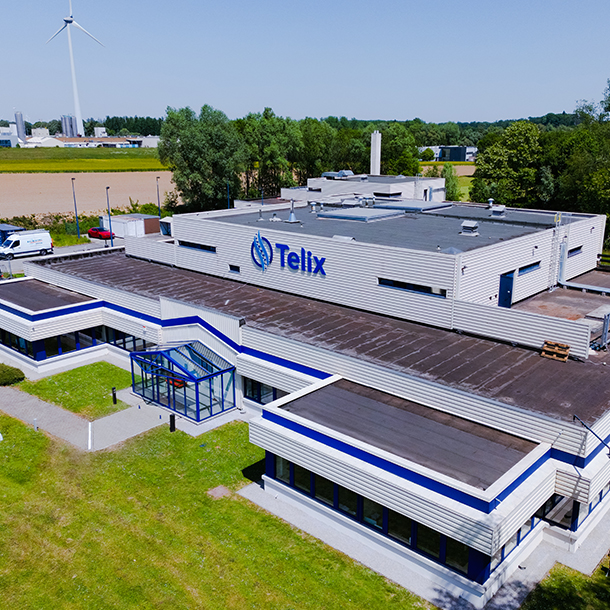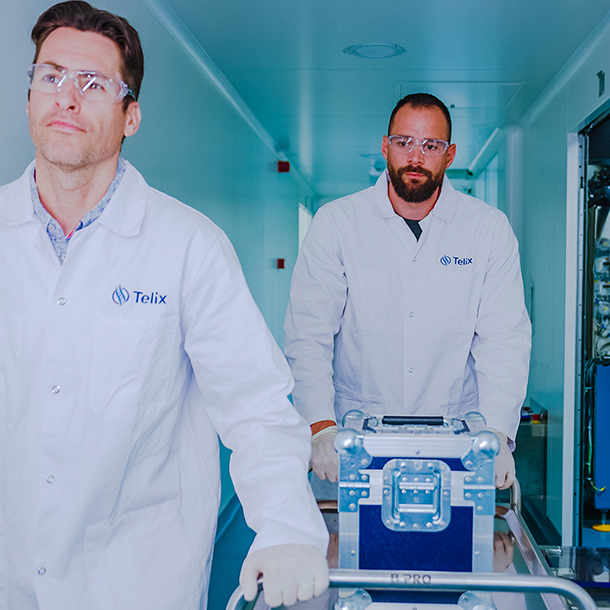Telix sets up in Seneffe
Telix Pharmaceuticals has opened its radiopharmacy facility in Seneffe.
This represents an investment of 14.1 million euros.

The facility, one of the largest in Europe, will focus on the manufacture of radioisotopes and clinical products for cancer treatment. Radiopharmaceuticals provide targeted and personalised treatments, and more than 10 million imaging procedures using these products are conducted each year in the EU. Telix Pharmaceuticals aims to meet patients’ growing needs and help fight cancer. This investment is considered essential to ensure the company’s long-term success in this field.
Telix Pharmaceuticals, a biopharmaceutical company specialising in targeted molecular therapies for cancer treatment, inaugurated its radiopharmacy facility in Seneffe in early June. This 14.1 million euro investment aims to strengthen research and development in the region, while improving patients’ access to innovative cancer treatments.
The facility, called Telix Manufacturing Solutions (TMS), is one of the largest radiopharmaceutical production facilities in Europe, covering a surface area of 2,888 square metres. It will serve as the main manufacturing site for radioisotopes as well as commercial and clinical products aimed at the Europe-Middle East-Africa (EMEA) region in particular.
Radiopharmaceuticals use targeting agents to deliver precise radiation to cancerous cells, wherever the tumour is in the body. This approach, known as ‘theranostics’, improves treatment decisions and enables personalised therapies to be provided to patients.
Each year, more than 10 million imaging procedures using radiopharmaceuticals are conducted in the European Union. With the growing development of imaging and therapies, the number of patients requiring these treatments should increase. According to sector analysts, the radiopharmaceuticals market is booming, with global sales estimated at 5 billion dollars in 2021 and a forecast of 33 billion dollars by 2031.
Telix Pharmaceuticals has emphasised the importance of this investment to meet patients’ needs and guarantee access to these promising treatments. The COVID-19 pandemic has also highlighted the importance of investing in the supply chain and manufacturing to ensure the long-term success of this new generation of cancer treatments.
Raphael Ortiz, Telix Pharmaceuticals EMEA CEO
We’re extremely grateful for the support of the Walloon regional government and Wallonia Export & Investment Agency and we hope that this facility will contribute to ongoing growth in our sector and encourage new investments in the region.

Raphael Ortiz, Telix Pharmaceuticals EMEA CEO, declared: “We learnt that if we have invested in the development of radiopharmaceutical products, we must also invest to guarantee that patients can access this new generation of cancer treatments. Given the just-in-time manufacturing and the complex logistics required for radiopharmaceuticals, it’s essential to lay the foundations for long-term commercial success in our field and to meet patients’ needs.”
The EMEA CEO added that “Belgium, and more specifically the ‘Radiopharmacy Valley’, play a fundamental role in Telix Pharmaceuticals’ success. The technology at the basis of our first commercial product was invented in Belgium. Our vision is that this facility will not be limited to Telix alone, but that it will become a research, development and manufacturing centre for our partners and employees from industry, the university sphere and clinical practice. We’re extremely grateful for the support of the Walloon regional government and Wallonia Export & Investment Agency and we hope that this facility will contribute to ongoing growth in our sector and encourage new investments in the region.”
Willy Borsus, Walloon government Minister for the Economy and Foreign Trade, concluded with these words: “Belgium has a proud history as a pioneer in the field of nuclear science and health technologies, and the Walloon region is home to a vital research, production, talent and transport hub known as Radiopharmacy Valley. We recognise the current and future utility of radiopharmaceuticals and the need to increase capacities so that the community can have access to these innovative technologies. We welcome Telix’s commitment to the region through the creation of this cutting-edge facility, which will attract talent and stimulate investment in many fields in Wallonia, such as research, employment, education and health.”
Nuclear medicine industry in Belgium-Wallonia
Today, Belgium is a world leader in medical isotope supply, and production of radiopharmaceuticals and nuclear medical equipment, with the nuclear medicine sector providing approximatively 5.000 jobs indirectly, and over 2.600 jobs directly. Belgium produces the second-largest amount of 99Mo molybdenum worldwide, benefiting over 7 million patients. Belgian technology is utilised by a third of hospitals worldwide.
Belgium provides a favourable environment for innovative sectors like nuclear medicine, offering various tax incentives and subsidy programs, such as withholding tax exemptions for researchers involved in R&D programs. Wallonia-Belgium is strategically located between Northern and Southern Europe and is hom to five major airports, including Liege Cargo. Most European destinations are under two hours away bu train or air travel. This advantageous location and connectivity foester an efficient supply chain for medical radioisotopes and equipment, benefiting Europe and beyond.
The Wallonia-Belgium region is home to 37 hospitals, with close proximity to around 400 hospitals in neighbouring regions of France, Luxembourg, the Netherlands and Germany.
Belgium has one of the highest concentration of nuclear medicine equipment and specialists per capita worldwide
- 35.000 shipments of radionuclides for medical applications from Belgium each year
- 160 SPECT/CT cameras (15/M inhabitants)
- 33 PET/CT cameras (3/M inhhabitants)
- 136 (N)MRI cameras (12/M inhabitants)
- 8 cyclotrons (7 for production of radioisotopes and 1 for proton therapy)
- 350 nuclear medicine specialists (30/M inhabitants)
